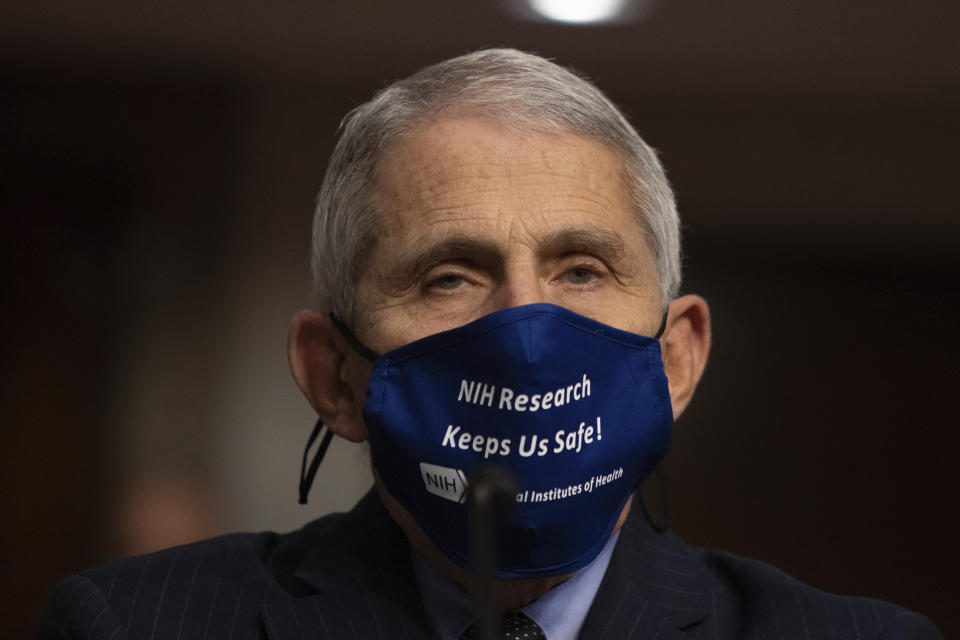Fauci: The US is still in the first wave of COVID-19
The U.S. is well into its third peak of the coronavirus, marking a new record for daily cases at more than 83,000 over the weekend.
The total case count has surpassed 8.6 million and the death toll rose above 225,000. Globally, more than 43 million have been affected with more than 1.1 million dead.
In recent days, some experts and reports have referred to this as a third wave, while others refer to it as either an elongated first wave or a second wave.
Dr. Anthony Fauci, the nation’s top infectious disease expert, settled the debate this Monday at Yahoo Finance’s annual All Markets Summit.
“I look at it more as an elongated — and an exacerbation of — the original first wave,” Fauci said.
He explained that while the Northeast has been able to reduce its outbreak, the national baseline never fell to a more manageable number like 10,000 cases per day. Instead it’s stayed high at about 20,000 cases per day.
In addition, for areas which chose to open up after the initial brief national lockdown, some states did not follow strict guidelines.
“We started to see a peak that brought us up to around 70,000 per day,” Fauci said, adding that, “Now as we're getting into the cold weather, we came back up again to the worst that we've ever had, which was over 80,000 per day.”

We’ve never really had waves in the sense of up and then down to a good baseline. It’s been wavering up and down. So now, we’re at the highest baseline. ... [It’s] kind of semantics. You want to call it the third wave or extended first wave. No matter how you look at it, it’s not good news,” he added.
A similar debate ensued in the summer, with many pointing to the surge hitting parts of the country that had yet been unaffected, thereby making it the first wave. Some experts say they are used interchangeably, and others say the differentiation is actually only between the local and national levels.
Former CDC Director Dr. Tom Frieden told Yahoo Finance the only focus should be knocking out the virus with known mitigation strategies.
“We have seen general misconceptions about the terms second and third waves since we are continuing to face an omnipresent risk of explosive spread. Our approach should be the same throughout,” he said.
Fauci also said it boils down to semantics.
“You want to call it the third wave or an extended first wave, no matter how you look at it, it's not good news,” he said.
Tara Smith, an epidemiologist at Kent State University, told Yahoo Finance the idea of a wave is not as relevant for the U.S. outbreak as it was during the 1918 flu pandemic.
“It was clear for 1918 because there seemed to be clear distinctions between the various flare-ups, but here, we've never gone back to baseline between peaks of cases. I'd say this is the third surge or peak,” she said.
Dr. Shira Doron, an infectious disease physician at Tufts Medical Center echoed Fauci's declaration of an elongated first wave.
“Only when looking back at the shape of a curve can you truly call something a peak or wave. It’s also important to mention that the overall U.S. graph looks very different than individual state graphs,” Doron said.
“The U.S. as a whole, however, never declined to low levels after its first peak, which is why some people say we are still in the ‘first wave,’” she said.
“Overall, I think it’s more a matter of semantics than something scientific.”
More from All Markets Summit:
Bill Gates on COVID-19: 'Fall 2021 won't be completely back to normal'
Bill Gates slams Trump's COVID-19 adviser as 'pseudo-expert' who's 'off-the-rails'
Land O’ Lakes CEO: We must invest in rural communities 'to make sure we have a vibrant America'
Electronic voting will become 'fraud proof' and it will prompt more people to vote: Adobe CEO
More from Anjalee:
Redfield: CDC 'preparing earnestly' for vaccine in November, December
India's tech giants navigate 'literally spiking' WFH demand, H1-B fears in coronavirus era
How protests spurred Corporate America into action on race, inequality
Read the latest financial and business news from Yahoo Finance
Follow Yahoo Finance on Twitter, Facebook, Instagram, Flipboard, SmartNews, LinkedIn, YouTube.

